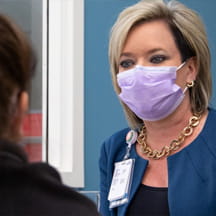It's an irony born out of our shared circumstances during a pandemic.
While maintaining distance from others is a fundamental strategy in slowing COVID-19's spread, a key mechanism for children's hospital leaders in managing through the crisis has been to gather together—virtually, of course—more frequently than before.
"I'm on the board of Children's Hospital Association, and we held a huddle every week to learn from each other—it was extremely helpful and important," says Sandra Fenwick, CEO, Boston Children's Hospital. "Clinicians have had huddles, and not just within the hospital. We've had daily huddles here at the hospital—through the command center and our leadership team—but also across the city. The mayor called an advisory group together and the collaboration has been essential in learning from each other."
Fenwick shared her insights in a recent webcast as a part of Harvard T.H. Chan School of Public Health's "Voices in Leadership" series. The discussion centered on leadership in crisis with a focus on the pandemic and included Fenwick's thoughts across a variety of topics.
On the pandemic's widespread effect across the pediatric health landscape
There is some serious concern that there has been a diminution in care for children. We are concerned that vaccinations are down, well-screening of children—for developmental as well as mental and behavioral health issues—have all been decreased, as has the management of chronic conditions for children with asthma and diabetes.
So, we need to catch up. We also need to be concerned about the social needs of these children who have been impacted by food insecurity, housing and the safety issues in many of our towns and cities. There is also a fear of coming in to the clinic, so we have to work to assure people that this is a safe place; our community health centers, primary care centers and hospitals are safe places, and they need to return for routine care.
On leading a children's hospital through a pandemic
The most important thing is surrounding yourself with the experts, those who are truly knowledgeable. They may be your top team, and they may be people deep in your organization. I talk about our supply chain people—they kept our hospital running.
People are the greatest asset this hospital has ever had—both historically and today. That's true of the immediate leadership on the clinical, research and executive side. Surrounding yourself with people who are experts and have a commitment and always emphasize doing what's right—and not always the easy thing to do—is how I have always tried to surround myself.
It's about listening to them and ensuring their voices and concerns are expressed so we have the most thoughtful amount of information before we make decisions—I don't have all the answers, but I certainly want to rely on those who can best inform our most challenging and difficult situations.
On how we can better prepare for future pandemics
Some of the things we could have done better would be to have a greater national surveillance system, a greater ability to stand up testing faster and an ability to think about how to do routine tracing and contact tracing. Another aspect would be the research that is continuously needed to understand pathogens which may or may not be known to the human body. All those things may have given us more tools to get ahead of this.
First and foremost, we must ensure there is the right amount of investment in children—children may only represent 25 percent of our population, but they are 100 percent of our future.
Their mental and behavioral health, the social determinants, their development before school, schools themselves and the real jeopardy children are in—we need to think about how we invest in children and make them both a national and a worldwide priority. Watch the webcast for more from Sandra Fenwick on leadership during crisis.


